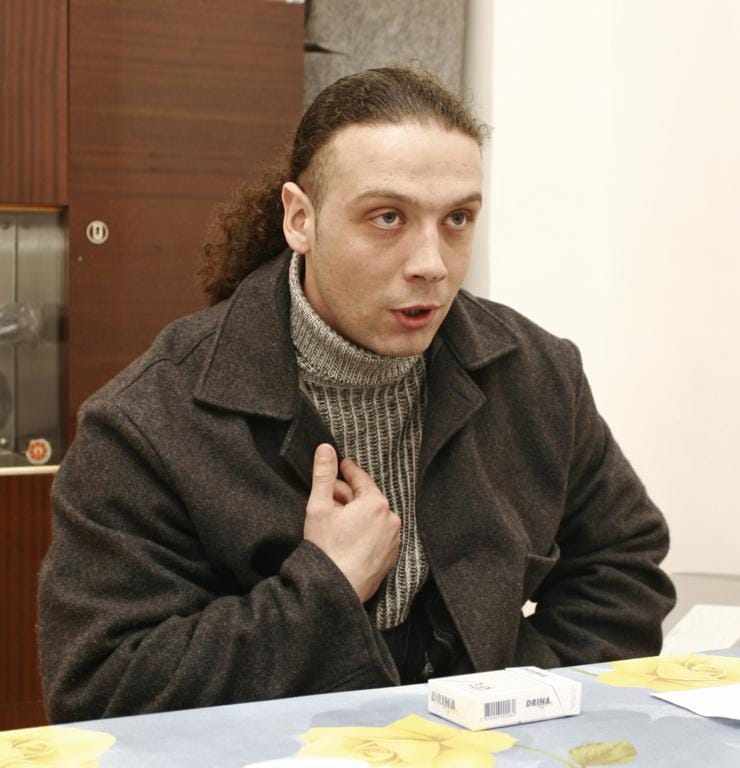They met at a tae-kwon-do martial arts session in 1999, the tall Sarajevo policeman and the twenty-year-old dark-haired criminology student.
Armin Gazibara walked Edita Čedić home. He came back to visit. He courted her, he wowed her. She introduced him, euphoric, to her mother, asking breathlessly what her mother thought.
But Zehra Čedić, 51, saw something different in Gazibara than her infatuated daughter. ‘Oh, dear child’ she remembers telling her, ‘I see some evil in his eyes.’

On the night before International Womens’ Day three years after they met, Gazibara asked Edita to marry him. When she said no — he shot her in the forehead. Then he shot her again, walked out the door past her mother and, as he remembers it, told her, ‘It’s your fault.’
What the heartsick mother thinks – what Gazibara’s own mother, Nevzeta, also thinks – is that the police are to blame.
They were too many warning signs. Gazibara’s superiors discounted the fistfights he got into and the aggressive behavior he displayed toward motorists. Later they explained away disturbing complaints about his harassing behavior and defended him, citing bureaucratic rules that require scared citizens to file public and formal reports against officers before they could do anything.
Even the murder of Edita Čedić seems not to have taught police much about vetting recruits or weeding out bad officers.
Things fell apart quickly
After the magical start of their relationship, Čedić and Gazibara moved in together. But the magic didn’t last long.
She was afraid of him, her mother says now. She felt imprisoned by his demands. For him, it wasn’t about love, her mother said. When he hit her with a shoe brush because his shoes were not shined, she moved back home.
The split brought much trouble to the Čedić home. Gazibara, in uniform, repeatedly came to their apartment. He badgered them. He threatened them with his gun. A couple of times he came with a fellow officer looking for his girlfriend.

The Čedićs asked the police for help. They informed Gazibara’s superiors of what he was doing but they think the police did not believe them.
‘He is a psychopath. He is a split personality’ Zehra Čedić said. ‘He has two faces. Where he worked, he made a nice impression. He was always ready to jump in, to help a comrade. And he was considered to be the best, and when we would report on him, they would take his side right away.’
Gazibara’s mother blames his bosses. ‘They could have prevented it’ she said. ‘And his chief… They could have prevented it…’
Jasnim Idrizović, then-commander of the Novo Sarajevo police station where Gazibara was stationed, said police did all they could. Gazibara was disciplined because of reports about his behavior, but none of those reports was serious enough to get him fired. The Čedić family never submitted a formal report or sued. He said he might have been able to do more if they had.
Zehra Čedić remembers bitterly how Idrizović had told her Gazibara wouldn’t do any harm. ‘The boss says, ‘No way. He wouldn’t dare. He knows what that means. He isn’t crazy.’
But Idrizović said ‘at no time did they want any action taken against Armin.’ Zehra Čedić admits that the family was afraid of their daughter’s suitor. They didn’t want him harmed; they just wanted him kept away.
Idrizović makes another point. Even if he had fired Gazibara, it may not have helped Edita. Gazibara quit the police job he’d held since 1998 in early 2001.
He went of his own accord. He took sick leave and never came back.
‘My direct influence on Armin Gazibara existed until Jan. 13, until the moment he went on sick leave. After that, we had no influence on where he was going’ Idrizović said.
By quitting Gazibara got out of all the disciplinary proceedings against him.
Behind bars
Gazibara’s police uniform has been replaced by a prison outfit. Now 29, he is serving a sentence of 14 years and eight months in Zenica prison.
In a recent interview he talked about his last months of freedom. He quit, he said, to go to Oslo in search of a new life for him and Edita. He said it was her idea.

But when he returned, she spurned his proposal. He could not bear the thought of her with another man.
‘Me or nobody’ he told her, a threat he repeats.
Dragging on a cigarette and arranging his long pony tail, Gazibara said he always had a temper. He calls himself a Sarajevo ‘hustler’ a street child who always hung out with troublesome people from Alipašino Polje. Brawls and guns were integral parts of his upbringing.
He got into fights with his colleagues and citizens who refused to present him their ID. A wrong word to him was reason enough to throw a punch or draw a gun.
A fellow officer asked him simply ‘What do you know?’ while they were working at the police station and he erupted, eager to show him he knew plenty.
According to the verdict that put him in jail as a murderer, Gazibara barged into Čedić’s room after a day drinking in a café with friends.
Gazibara’s story is that he’d celebrated International Women Day with his girlfriend and bought her a watch to propose. When she said no, he gave her until that night to change her mind.
He said he called her later and when she again said she would not marry he decided to kill her.
He told his parents he was going to kill her. He took a taxi to her building, he said, broke through the apartment door and the door to her room, where her mother said she was studying for an exam.
‘I wasn’t thinking, which is the worst’ he recounted. ‘Honestly, I don’t remember much. I remember the taxi. I remember the door and I remember the room. I barely made myself fire the first bullet. I saw blood, and then I thought maybe I missed, and in a second I thought the police will be here. You are going to prison now. What did you do?’
He says he misses her. Sometimes he’s sorry but other times he thinks he did the right thing.
After the murder, Gazibara hid out in the apartment of Emir Kadrić, a policeman and friend. Kadrić gave Gazibara his gun, then cleaned and hid it after the murder. He was later sentenced to one year and two months in prison for aiding and abetting his friend. His defense in court was that he was afraid of Gazibara.
The ex-officer got more support from his former co-workers during his trial in Sarajevo cantonal court.
‘In principle, policemen stick together and they very rarely turn their back on a colleague’ says Idrizović.
Čedić is sure that the show of police solidarity dissuaded some fearful witnesses from testifying. She has lost all faith in the police force.
He isn’t crazy
Should police have known there was something murderously wrong with Gazibara? Idrizović said doctors certified him fit. And at trial, no psychiatric condition was diagnosed. Neuropsychiatrist Abdulah Kučukalić testified that Gazibara showed no signs of temporary or permanent mental condition, no psychotic character and no symptoms of mental retardation.
At Zenica, the director’s assistant for prisoner treatment, Zulfikar Vojčić, said Gazibara is no problem. ‘He doesn’t show disturbances in space and time. There are no difficulties in initiating contact.’ As soon as he served a third of his sentence, Gazibara will be eligible for extended four-day weekends out of the prison.
Police say they plan no special protection or watch over the Čedić family when that happens.
Gazibara says he still has a temper and he still fights. He said he is no stranger to solitary confinement because he gets into brawls in prison often. He said it was easier to kill wise guys and thugs than a girl. He always has a good reason for violence.
‘Without reason, believe me, I wouldn’t… as they say, hurt a fly. With a cause… By god, you wouldn’t fare well. I don’t bother you and you tease me. I have to kill you’ he told a visitor.








